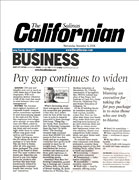Integrity Matters
November 8, 2006
Pay gap continues to widen

 Question: (E-265)
Question: (E-265)
Dear Jim:
CEO pay and benefits now run as much as 1,000 times that
of front-line employees. Will such inequities destroy whatever
is left of the trust that needs to exist between labor
and management?
 Response:
Response:
Yes, because short-sighted members of corporate boards'
compensation committees repeatedly send demoralizing
signals to the rank-and-file. Frontline employees feel
relegated to second- or even third-class slot-fillers,
asked to accept minimum cost-of-living raises and nod
acceptingly while those in corner offices reap giant
stock options and bonuses.
Simply blaming an executive for taking the fat pay package
is to miss those who are truly to blame. After all, who
approves these packages? The members of the board of
directors! The same workers who resent pay disparities
are forced to pay ever-higher prices for products and
services that have been intentionally inflated by irresponsible
corporate boards that overpay "rock star" executives.
What's fascinating about these outrageous but culturally
acceptable pay practices is that they don't reflect what
the best of the best do. Case in point is research presented
in Jason Jennings' 2005 book, "Thing Big - Act Small,
How America's Best Performing Companies Keep the Start-Up
Spirit Alive." The Jennings research team screened
more than 100,000 U.S. companies to find nine that rarely
end up on magazine covers but have grown by 10 percent
or more for 10 straight years. Then they interviewed
the leaders, workers and customers of these quiet superstars
to identify the secret to their astonishing results.
America's Nine Best Performing Companies, according to
Jennings are: Cabela's of Sidney, Neb.; Dot Foods of
Mount Sterling, Ill.; Koch Industries of Wichita, Kan.;
Medline Industries of Mundelein, Ill.; O'Reilly Automotive
of Springfield, Mo.; PETCO Animal Supplies of San Diego;
SAS Institute of Cary, N.C.; Sonic Drive-In, Oklahoma
City; and Strayer Education of Arlington, Va.
Of the 10 building blocks he considers essential to their
success, humility comes first. Here are the other nine:
Keep your hands dirty; make short-term goals and long-term
horizons; let go; have everyone think and act like an
owner; invent new businesses; create win-win solutions;
choose your competitors; build communities; and grow
future leaders from within.
To contrast these world-class companies with flashy pretenders,
consider these operating aspects of the first building
block, called "down to Earth and humble":
- Stewardship - respect and protect resources
- Transparency - information availability
- Accessibility - visible, attentive, respective
- Work ethic - lead by example, offering praise
- Stand for something - mission beyond self-interest
- Erase superficial distinctions - everyone is important
- No big offices - stay humble
Trust is built with integrity in small and large enterprises!